September is Suicide Prevention Awareness Month
September 20, 2023

I consider myself deep into long-term mental health recovery. I started experiencing significant episodes of depression and anxiety in my early 20s, and it’s been a long and rocky road – involving numerous professionals and medications – to the stability I have today. Recovery can feel isolating and overwhelming and is still highly stigmatized. I often thought it would be nice to have someone with similar experiences walk alongside me on the journey. That is what I do now.
Mental health treatment has evolved positively in recent years, including the rapid growth of the job known as a peer support specialist. Peer support workers are people who have been successful in the recovery process and use their experience to help others. I’ll address mental health peer specialists, although there are other types of peer services delivered by people in recovery from substance use disorders, homelessness, and supporting veterans, among others.
Peer work occupies an unusual place in mental-health recovery because it is not wholly part of the system, even when peers work in hospitals or other clinical settings. Peers do not diagnose. We don’t recommend medications or courses of treatment. We are not in a position of authority like physicians. Peers support individuals in their right to decide their best path to recovery. We provide hope: many people who have received a mental health diagnosis feel that change is beyond their grasp. Mental health peer support specialists demonstrate that recovery is possible and can help show the way. Peer work is more than just listening. It involves helping peers accomplish the things they believe are most important. It could be helping someone figure out how to find a new place to live or a job or untangling financial or legal paperwork. It could involve helping give someone the confidence to advocate for themselves regarding medication or courses of treatment.
I am working toward my state certification as a mental health peer support specialist by volunteering at the Self-Help and Advocacy Center (the SHAC), a peer organization in South Austin operated by Austin Mental Health Community. In peer work, I find the most valuable skill to be "radical listening", the process of holding space for others. I may speak with someone with a very different life experience from me, but we both live with a mental health diagnosis. We are not alone. When working with a peer in distress, I have found few words as powerful as this short sentence: “Me, too." If you’re interested in resources about peer work or just talking about it, feel free to contact me at
September 20, 2023
August 09, 2023
July 10, 2023